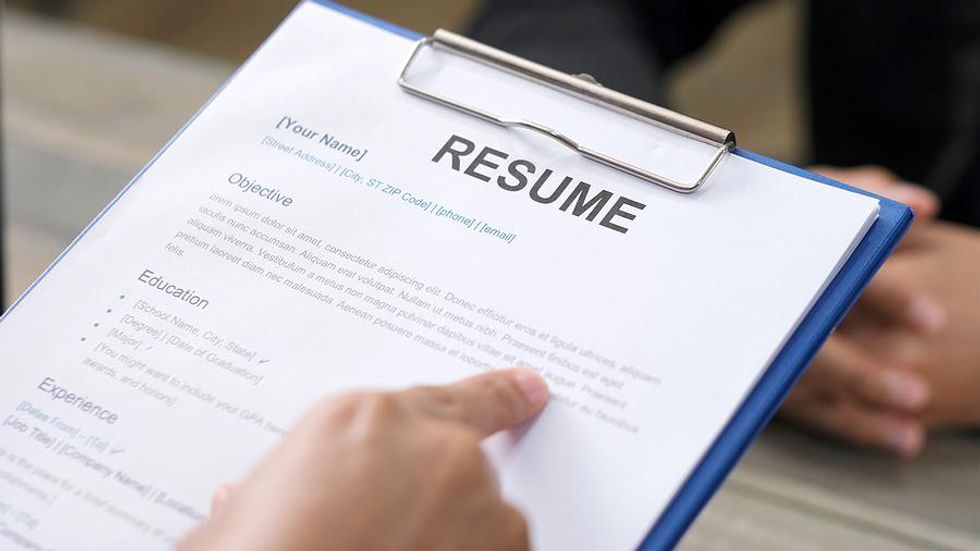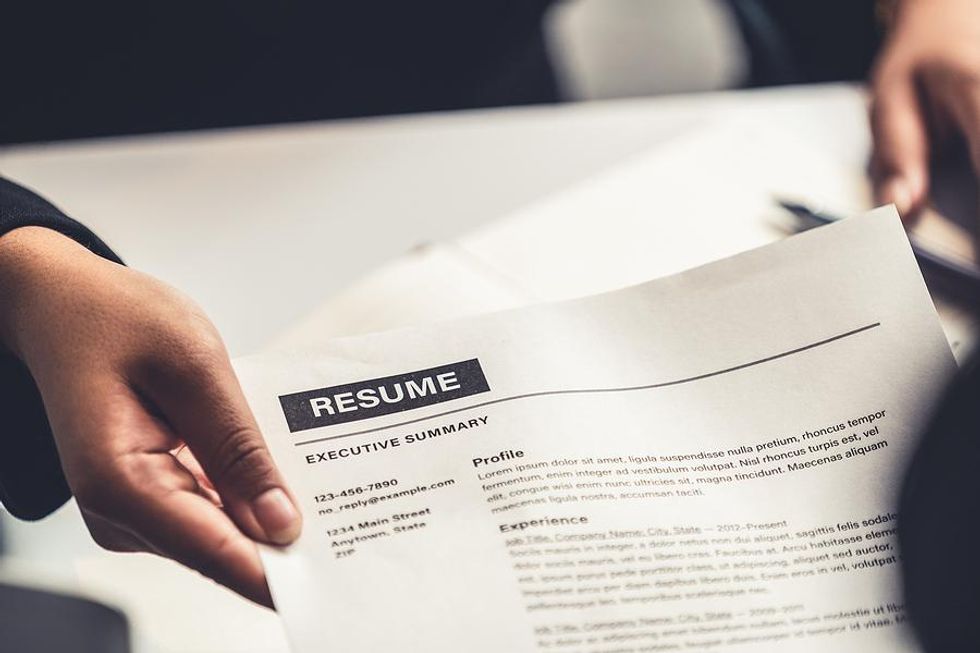
A resume is the first opportunity you have to make an impression on a hiring manager or recruiter. And it's important to make a great first impression. The average recruiter spends mere seconds scanning your resume so you need to make yourself stand out.
We've compiled a list of some important factors to keep in mind when creating or updating your resume. Here are the 10 key components of a great resume.
1. Organized Format
Structure your resume in an organized manner; keep your font simple, your layout appealing, and your spacing consistent. You want your resume to be easy to read too, so make sure you have enough white space. You don't want to overwhelm hiring managers or recruiters with too much text. An organized resume format will automatically make them want to give your resume a closer look.
2. Correct Spelling/Grammar

Bigstock
Spellcheck everything at least twice and have someone else proofread your resume before you submit it. Spelling or grammar mistakes give hiring managers and recruiters the impression that you don't pay attention to details and don't really care about the job you're applying for. Avoid these mistakes at all costs!
3. Professional Attitude

Bigstock
List a professional-sounding email address—not "partyanimal_687" or "2cool4u15." Also, list a phone number that is attached to a professional voicemail greeting. Potential employers don't need to hear reality TV, loud music, kids crying, or road noise in the background. If this means you have to re-record your voicemail greeting, so be it.
4. Objective Keywords

Bigstock
Leave out subjective words like "reliable" and "hard-working." A potential employer is not going to bring you in for an interview because you say you're reliable. They are going to bring you in because they think you can solve a problem for them. This is why quantifying your work experience on your resume is essential.
5. Keywords From The Job Description

Bigstock
Incorporate words in your resume that are listed in the job description of the position you're applying for. This will help you get your resume past the ATS and also help a hiring manager quickly see that you're a fit for the position.
6. Brief Explanations For Employment Gaps And Layoffs

Bigstock
If you were let go from several positions due to downsizing, mention this. If you have a large gap in your employment history, explain what you were doing during that time and what you learned. Keep your explanations short and sweet.
7. Relevant Job/Internship/Volunteer Experience

Bigstock
If you're a veteran in your industry, you don't need to list the very first job you had decades ago. Keep your employment history to the past 10-15 years if you have a substantial amount of industry-related experience. If you're a recent graduate, listing the part-time job you had in college is fine—but you also want to list any internships, volunteer work, coursework, or projects you had that are relevant to the job. Unpaid experience still counts.
8. Effective Use Of Space

Bigstock
Treat each word on your resume like beachfront property. Space is so valuable. Make every word you use count. Remember not to jam too much text on your resume either. You want just enough information to get hiring managers and recruiters to give you a call.
9. Customized Cover Letter

Bigstock
Your cover letter should contain content that is different from your resume and should match up very well with the job description. This means you will need to rewrite your cover letter for each job you apply for. To get the best results, make sure you're writing disruptive cover letters so you can stand out in the hiring process.
10. Realistic Expectations

Bigstock
Be optimistic, but realistic. If a job description lists a required task that you're confident you can do, try to word and quantify your past experience to reflect that. But if a job description lists seven required skills or certifications and you only have three of them, then you don't meet the qualifications and shouldn't apply.
It's a great time to update your resume and reflect a bit on your strengths and skills. Being able to effectively and succinctly summarize your skills, education, and experience is important for everyone—regardless of whether you intend to seek employment in the near future. These resume tips are intended to help you put forth the best possible impression of yourself on paper. You only get one chance to make a great impression, so make yours count!
Need more help with your job search?
Become a member to learn how to land a job and UNLEASH your true potential to get what you want from work!
- 5 Steps To A Powerful Personal Brand On Your Executive Resume ›
- 3 Components Of Executive Presence Every Leader Should Know ›
- 10 Things To Remove From Your Resume ›
- 10 Ways To Condense Your Resume Without Losing Value - Work It ... ›
- 7 Ways To Tailor Your Resume For A Leadership Position - Work It ... ›
- How To Optimize The Most Important Part Of Your Resume - Work It ... ›
- 6 Tips For Effectively Using Bullet Points On Your Resume - Work It ... ›
- 3 Ways To Update Your Resume To Land More Job Interviews - Work It Daily ›
- Get The Interview: 5 Tips For Leaving A Great Voicemail - Work It Daily ›
- How To Follow Up On Your Resume Submission - Work It Daily ›
- 4 Tips For Writing A Powerful (And Effective) Resume - Work It Daily ›

 Bigstock
Bigstock Bigstock
Bigstock Bigstock
Bigstock


